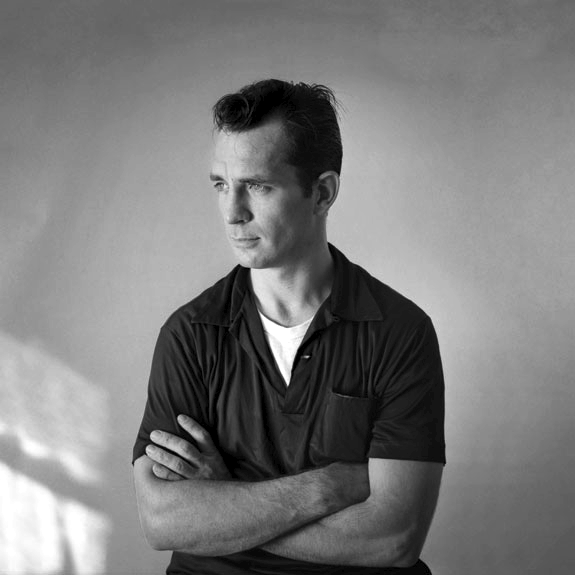
Image by Tom Palumbo, via Wikimedia Commons
Jack Kerouac wants you to turn writing into “free deviation (association) of mind into limitless blow-on-subject seas of thought, swimming in sea of English with no discipline, other than rhythms of rhetorical exhalation and expostulated statement….” Think you can do that? Find out by following Kerouac’s “Essentials of Spontaneous Prose.” He published this document in Black Mountain Review in 1957 and wrote it in response to a request from Allen Ginsberg and William S. Burroughs that he explain his method for writing The Subterraneans in three days time.
And for a theory of Kerouac’s not quite theory, visit the site of Marissa M. Juarez, professor of Rhetoric, Composition, and the Teaching of English at the University of Arizona. Juarez raises some salient points about why Kerouac’s “Essentials” bemuse the English teacher: His method “discourages revision… chastises grammatical correctness, and encourages writerly flexibility.” Read Kerouac’s full “Essentials of Spontaneous Prose” here or below. [Note: If you see what looks like typos, they are not errors. They are part of Kerouac’s original, spontaneous text.]
SET-UP: The object is set before the mind, either in reality. as in sketching (before a landscape or teacup or old face) or is set in the memory wherein it becomes the sketching from memory of a definite image-object.
PROCEDURE: Time being of the essence in the purity of speech, sketching language is undisturbed flow from the mind of personal secret idea-words, blowing (as per jazz musician) on subject of image.
METHOD: No periods separating sentence-structures already arbitrarily riddled by false colons and timid usually needless commas-but the vigorous space dash separating rhetorical breathing (as jazz musician drawing breath between outblown phrases)– “measured pauses which are the essentials of
our speech”– “divisions of the sounds we hear”- “time and how to note it down.” (William Carlos Williams)
SCOPING: Not “selectivity” of expression but following free deviation (association) of mind into limitless blow-on-subject seas of thought,
swimming in sea of English with no discipline other than rhythms of rhetorical exhalation and expostulated statement, like a fist coming down on a table with each complete utterance, bang! (the space dash)- Blow as deep as you want-write as deeply, fish as far down as you want, satisfy yourself first, then reader cannot fail to receive telepathic shock and meaning-excitement by same laws operating in his own human mind.
LAG IN PROCEDURE: No pause to think of proper word but the infantile pileup of scatological buildup words till satisfaction is gained, which will turn out to be a great appending rhythm to a thought and be in accordance with Great Law of timing.
TIMING: Nothing is muddy that runs in time and to laws of time-Shakespearian stress of dramatic need to speak now in own unalterable way or forever hold tongue-no revisions (except obvious rational mistakes, such as names or calculated insertions in act of not writing but inserting).
CENTER OF INTEREST: Begin not from preconceived idea of what to say about image but from jewel center of interest in subject of image at moment of writing, and write outwards swimming in sea of language to peripheral release and exhaustion-Do not afterthink except for poetic or P. S. reasons. Never afterthink to “improve” or defray impressions, as, the best writing is always the most painful personal wrung-out tossed from cradle warm protective mind-tap from yourself the song of yourself, blow!-now!-your way is your only way- “good”-or “bad”-always honest (“ludi- crous”), spontaneous, “confessionals’ interesting, because not “crafted.” Craft is craft.
STRUCTURE OF WORK: Modern bizarre structures (science fiction, etc.) arise from language being dead, “different” themes give illusion of “new” life. Follow roughly outlines in outfanning movement over subject, as river rock, so mindflow over jewel-center need (run your mind over it, once) arriving at pivot, where what was dim-formed “beginning” becomes sharp-necessitating “ending” and language shortens in race to wire of time-race of work, following laws of Deep Form, to conclusion, last words, last trickle-Night is The End.
MENTAL STATE: If possible write “without consciousness” in semi-trance (as Yeats’ later “trance writing”) allowing subconscious to admit in own uninhibited interesting necessary and so “modern” language what conscious art would censor, and write excitedly, swiftly, with writing-or-typingcramps, in accordance (as from center to periphery) with laws of orgasm, Reich’s “beclouding of consciousness.” Come from within, out-to relaxed and said.
Oh, and for authenticity’s sake, you should try Kerouac’s “Essentials” on a typewriter. It’s all he had when he wrote The Subterraneans. No grammar robots to distract him.
via Al Filries
Related Content:
Jack Kerouac’s 30 Beliefs and Techniques For Writing Modern Prose
Cormac McCarthy’s Three Punctuation Rules, and How They All Go Back to James Joyce
William S. Burroughs’ Short Class on Creative Reading
“Expansive Poetics” by Allen Ginsberg: A Free Course from 1981
Josh Jones is a writer and musician based in Durham, NC. Follow him at @jdmagness


In Lynda Barry’s “What It Is”, she recommends a similar technique for creative inspirational writing. Sit down with paper, write as fast as possible for seven minutes, put aside for at least a week.nI’ve done this and it’s a great deal of fun — try it!
Goddamn I love this blog. Probably one of my top 5 things on the internet. Never slips.nnThank you for this content.
mind to fingers
message received
oh!
fingers to mind- mind
Thanks for the validation
Practical analysis . For what it’s worth , if your company is requiring a permit search , my business used a sample version here
https://goo.gl/Y8YzOI